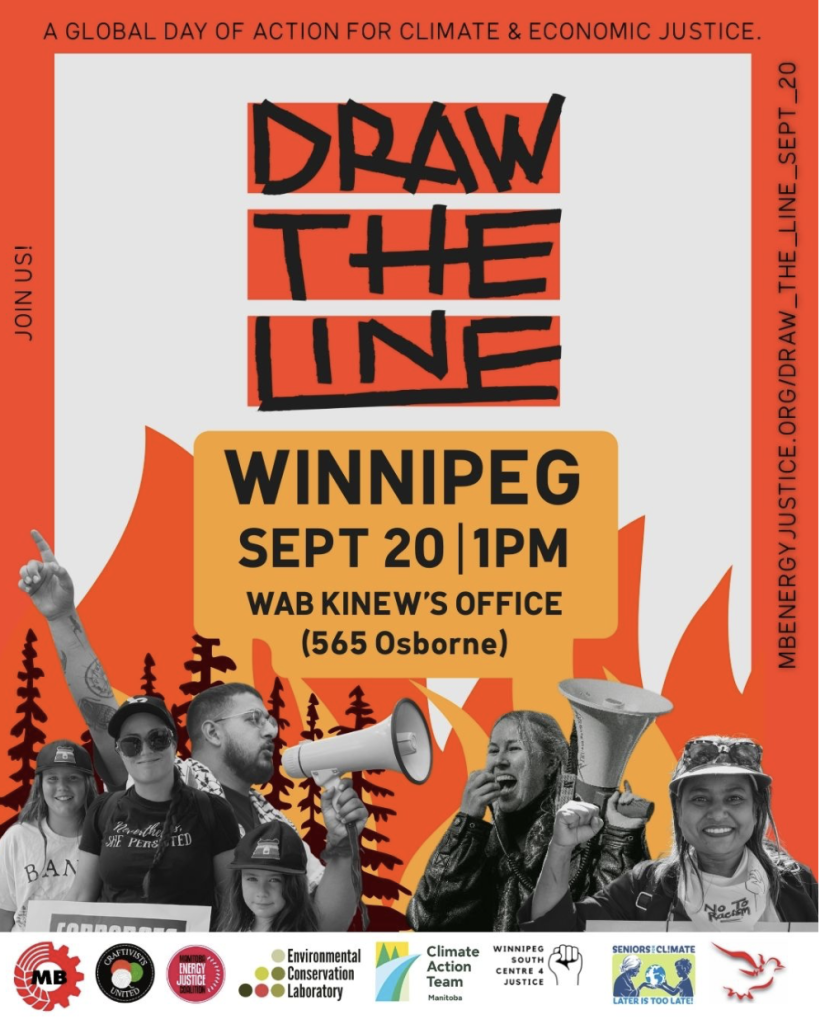Wildfires are burning bigger, faster, and more often across Manitoba. Even when the flames are out of the news, their impacts remain — on the air we breathe, the water we drink, and the safety of our communities.
These fires are not just “natural disasters.” They show the deeper problems we face today:
Manitoba is in the middle of one of its worst wildfire seasons ever. So far in 2025, over 8.3 million hectares have burned across Canada, more than twice the 10-year average for this time of year (Natural Resource Canada, 2025). In fact, this year has officially become the second-worst wildfire season in Canadian history, trailing only the record-breaking blaze of 2023 (Bowden, 2025).
Canada is warming twice as fast as the global average, which means hotter, drier conditions are fueling longer and more intense fire seasons (Canadian Climate Institute, 2023). This is climate change in action. It’s not a future problem—it’s here now, and Manitoba is on the front lines. To learn more about how climate change is driving wildfires in Manitoba, watch the video below.
Wildfires that began in spring are still burning in Manitoba — similar to an active fire season nearly 30 years ago. How much of this year’s fire situation can be attributed to climate change? Watch the CBC News video to learn more.
First Nations communities are hit the hardest by wildfires, yet they are often left with unsafe evacuations, poor support, and long-lasting damage to their homes, health, and lands.


This summer, Mathias Colomb First Nation (Pukatawagan) was evacuated for more than 100 days after fire destroyed power lines (Orozco, 2025). Families were scattered across the province, unable to return home. The chief asked for funding for a temporary generator so people could come back sooner, but governments refused (Orozco, 2025) — while Manitoba Hydro was slow to restore power poles and critical infrastructure. Though repairs have begun, Manitoba Hydro’s repairs are slow, with full restoration in some remote communities now estimated to take from September to October—a whole month (Hydro’s own timeline) (Manitoba Hydro, n.d.).
In the Island Lake region, four First Nations were forced to evacuate multiple times this year (Scott, 2025). Chiefs say these emergencies could have been prevented if governments invested in firebreaks, local firefighters, and safe road access (Scott, 2025). Instead, far more money is spent on evacuations after fires start than on prevention.
As Grand Chief Alex McDougall said (Scott, 2025):
“We are not burning because of fate, we are burning because budgets refuse to bend. Let’s choose investment over neglect.”
*For up-to-date health information and resources for communities impacted by wildfires, visit Shared Health Manitoba’s wildfire updates page.

On September 20, 2025, we’re drawing the line – for People. For Peace. For the Planet.
Rally at Wab Kinew’s Consituency Office (565 Osborne Street)
Join us as we mobilize alongside tens of thousands of people around the world to fight for climate justice, economic justice, Indigenous rights, migrant rights, and anti-genocide movements.
Manitoba is ravaged by fires. Premier Kinew is pro-pipeline. Canada spends billions on militarism and enacts anti-Indigenous, anti-migrant, and fossil fuel-driven policy. Now is the time for Manitobans to join together with other Canadians to DRAW THE LINE – end fossil fuel expansion, respect Indigenous sovereignty, support migrant rights, and end the war machine!
We are not okay with the inaction of our leaders. We demand real change NOW. We want a better world for ourselves, our children and our communities. A world with clean, affordable energy for everyone. A world where we can speak up for our rights, where people and nature are safe, and where big polluters help pay to fix the climate crisis. *Visit Manitoba Energy Justice Coalition to join this event: Drawtheline